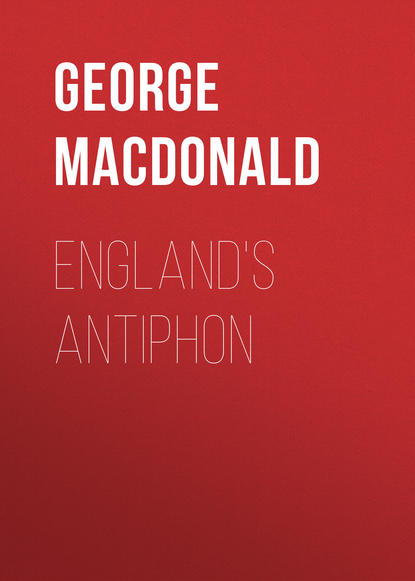По всем вопросам обращайтесь на: info@litportal.ru
(©) 2003-2025.
✖
England's Antiphon
Настройки чтения
Размер шрифта
Высота строк
Поля
His Divine Epigrams are not the most beautiful, but they are to me the most valuable of his verses, inasmuch as they make us feel afresh the truth which he sets forth anew. In them some of the facts of our Lord's life and teaching look out upon us as from clear windows of the past. As epigrams, too, they are excellent—pointed as a lance.
Upon the Sepulchre of our Lord.
Here, where our Lord once laid his head,
Now the grave lies buriëd.
The Widow's Mites.
Two mites, two drops, yet all her house and land,
Fall from a steady heart, though trembling hand;
The other's wanton wealth foams high and brave:
The other cast away—she only gave.
On the Prodigal.
Tell me, bright boy! tell me, my golden lad!
Whither away so frolic? Why so glad?
What! all thy wealth in council? all thy state?
Are husks so dear? Troth, 'tis a mighty rate!
I value the following as a lovely parable. Mary is not contented: to see the place is little comfort. The church itself, with all its memories of the Lord, the gospel-story, and all theory about him, is but his tomb until we find himself.
Come, see the place-where the Lord lay.
Show me himself, himself, bright sir! Oh show
Which way my poor tears to himself may go.
Were it enough to show the place, and say,
"Look, Mary; here see where thy Lord once lay;"
Then could I show these arms of mine, and say,
"Look, Mary; here see where thy Lord once lay."
From one of eight lines, on the Mother Mary looking on her child in her lap, I take the last two, complete in themselves, and I think best alone.
This new guest to her eyes new laws hath given:
'Twas once look up, 'tis now look down to heaven.
And here is perhaps his best.
Two went up into the Temple to pray.
Two went to pray? Oh rather say,
One went to brag, the other to pray.
One stands up close, and treads on high,
Where the other dares not lend his eye.
One nearer to God's altar trod;
The other to the altar's God.
This appears to me perfect. Here is the true relation between the forms and the end of religion. The priesthood, the altar and all its ceremonies, must vanish from between the sinner and his God. When the priest forgets his mediation of a servant, his duty of a door-keeper to the temple of truth, and takes upon him the office of an intercessor, he stands between man and God, and is a Satan, an adversary. Artistically considered, the poem could hardly be improved.
Here is another containing a similar lesson.
I am not worthy that thou shouldst come under my roof.
Thy God was making haste into thy roof;
Thy humble faith and fear keeps him aloof.
He'll be thy guest: because he may not be,
He'll come—into thy house? No; into thee.
The following is a world-wide intercession for them that know not what they do. Of those that reject the truth, who can be said ever to have truly seen it? A man must be good to see truth. It is a thought suggested by our Lord's words, not an irreverent opposition to the truth of them.
But now they have seen and hated.
Seen? and yet hated thee? They did not see—
They saw thee not, that saw and hated thee!
No, no; they saw thee not, O Life! O Love!
Who saw aught in thee that their hate could move.
We must not be too ready to quarrel with every oddity: an oddity will sometimes just give the start to an outbreak of song. The strangeness of the following hymn rises almost into grandeur.
EASTER DAY
Rise, heir of fresh eternity,
From thy virgin-tomb;
Rise, mighty man of wonders, and thy world with thee;
Thy tomb, the universal East—
Nature's new womb;
Thy tomb—fair Immortality's perfumed nest.
Of all the glories[139 - Which understood.] make noon gay
This is the morn;
This rock buds forth the fountain of the streams of day;
In joy's white annals lives this hour,
When life was born,
No cloud-scowl on his radiant lids, no tempest-lower.
Life, by this light's nativity,
All creatures have;
Death only by this day's just doom is forced to die.
Nor is death forced; for, may he lie
Throned in thy grave,
Death will on this condition be content to die.
When we come, in the writings of one who has revealed masterdom, upon any passage that seems commonplace, or any figure that suggests nothing true, the part of wisdom is to brood over that point; for the probability is that the barrenness lies in us, two factors being necessary for the result of sight—the thing to be seen and the eye to see it. No doubt the expression may be inadequate, but if we can compensate the deficiency by adding more vision, so much the better for us.
In the second stanza there is a strange combination of images: the rock buds; and buds a fountain; the fountain is light. But the images are so much one at the root, that they slide gracefully into each other, and there is no confusion or incongruity: the result is an inclined plane of development.











